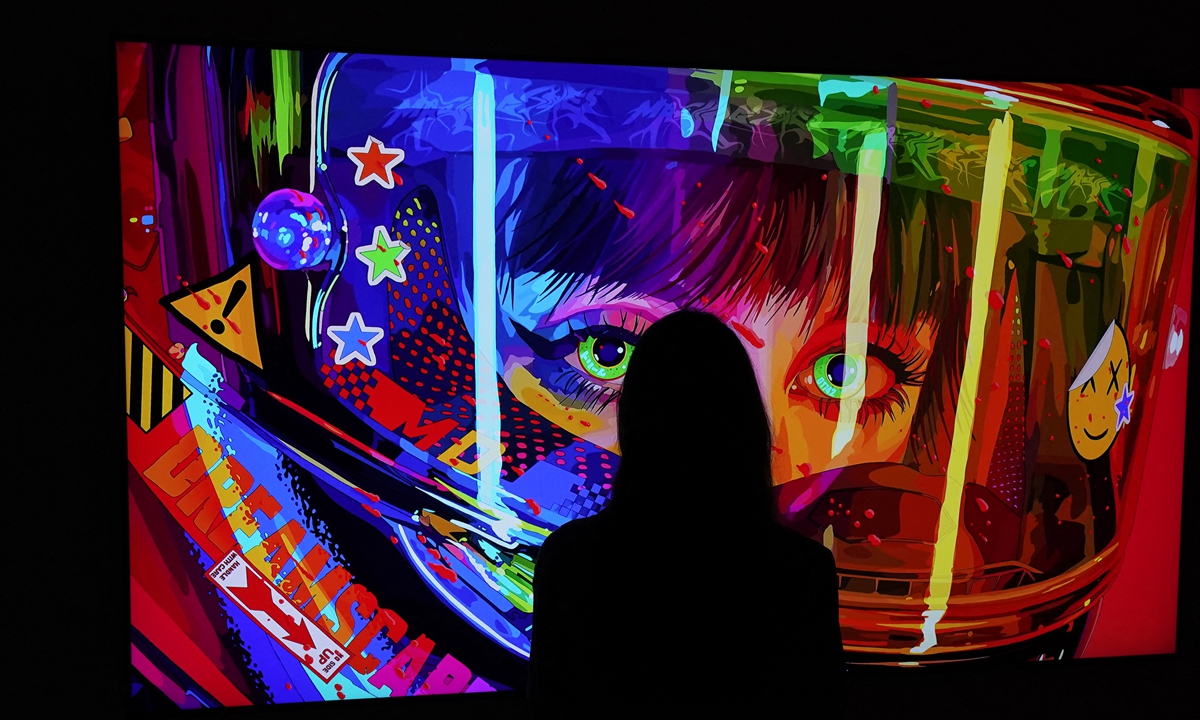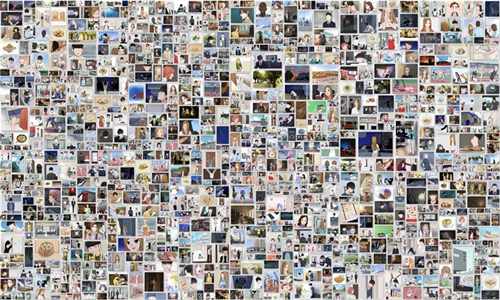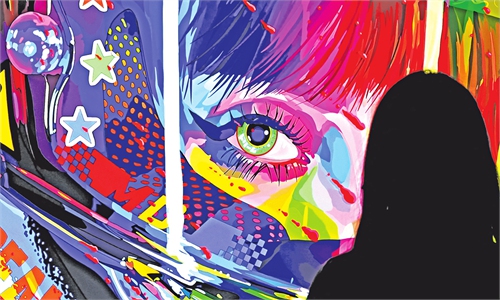
A woman looks at an NFT artwork by Mad Dog Jones titled SHIFT/ on June 10 in New York. Top: An NFT artwork by Ryoji Ikeda titled A Single Number That Has 10,000,086 Digits Photos: AFP
As China's cryptocurrency industry grinds to a halt amid an intensified nationwide crackdown against cryptocurrency mining, non-fungible token (NFT), a type of digital asset, is gradually gaining momentum in the country with the help of domestic tech giants such as Alibaba.
On Wednesday, local media reported East China's Anhui Province will close all local cryptocurrency mining projects amid tight power supply. As things stand, nearly 90 percent of China's Bitcoin mining capacity has been shut down.
Previously, Southwest China's Sichuan Province, Northwest China's Xinjiang Uygur Autonomous Region, North China's Inner Mongolia Autonomous Region and Southwest China's Yunnan Province have all announced rules curbing Bitcoin mining.
While on the other side, a new digital token that's using the same underlying technology as virtual currencies including Bitcoin, is shaking up the world.
An NFT is a digital asset that exists on blockchain. The blockchain serves as a public ledger, allowing anyone to verify the asset's authenticity and ownership. Unlike most digital items which can be endlessly reproduced, each NFT has a unique digital signature, meaning it is one of a kind, according to a definition on a Reuters report.
NFTs are usually bought with the cryptocurrency Ether or in dollars and the blockchain keeps a record of transactions. While anyone can view the NFTs, the buyer has the status of being the official owner - a kind of digital bragging rights, Reuters said.
Latest high-profile show-up of NFT is on Monday when Italy won the European Cup with a penalty kick, with the Portuguese player Cristiano Ronaldo winning the 2020 European Cup scoring champion and took home the first NFT trophy ever in history.
At the same time, Alipay, an affiliate of China's e-commerce giant Alibaba, and official partner of the tournament, also distributed the same digital trophy to 1,600 winning users who won the European Cup quiz.
In June, Alipay launched in China 8,000 limited-edition NFTs based on two pieces of artwork to commemorate the ancient artwork from the Dunhuang Caves. The firm has put on sale the two NFT-backed app images, with the items quickly selling out.
Following Alibaba, a workshop under NetEase also recently released its first IP-to-NFT work in late June, with a limited edition of 333 pieces worldwide.
Nevertheless, a wider adoption of the tokens has caused confusion on Chinese social media where they were linked to virtual currencies such as Bitcoin, especially when the country is currently tightening rules on the industry to fend off financial risks."
"NFT is not interchangeable, nor divisible, making it different by nature from cryptocurrencies such as Bitcoin," a spokesperson at AntChain explained in a Reuters report, highlighted distinction between NFTs and cryptocurrencies.
An official introduction of Alipay showed that AntChain defines "NFT" as "non-homogeneous token," emphasizing that "NFT is essentially different from virtual currency equivalent tokens, and is supported by the actual value of digital goods. It does not have any currency attributes such as payment functions," according to a report published on domestic news site sina.com.
The digital assets have quickly exploded in popularity over the past year around the world, especially in the art industry with NFT artworks selling for millions of dollars.
Almost any kind of digital object - images, videos, music, text and even tweets - can be turned into an NFT, an industry insider surnamed Zheng, told the Global Times on Wednesday.
Zheng believed that the market potential of NFT is huge, but also cautioned that it is inevitable that NFTs may be used for speculation. "It is necessary for the regulatory authorities to draw the red line as soon as possible and issue guidelines for the development of related digital commodities, so that related industries can be regulated on the premise under healthy and long-term development."
With a large user base and a wider application area, NFTs are also more easily to be promoted in China, another close follower of the blockchain industry, told the Global Times on Wednesday, noting that industry giants like Alibaba can have an advantage in the area.
"So far, US is the place where the industry is growing fastest," said the person, who preferred not to be named.


